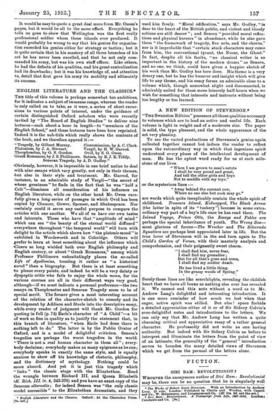A NEW EDITION OF STEVENSON.* "THE Swanston Edition" possesses all
those qualities necessary to volumes which are to lead an active and useful life. Each volume is light in weight and of a moderate size. The paper is solid, the type pleasant, and the whole appearance of the set very pleasing.
To see the varied productions of Stevenson's genius again collected together cannot but induce the reader to reflect upon the extraordinary way in which that ingenious spirit understood every phase of the intellectual development of man. He has the aptest word ready for us at each mile- stone of our lives.
" When I am grown to man's estate I shall be very proud and great, And tell the other girls and boys Not to meddle with my toys."
Or the mysterious lines :—
" Away behind the currant row;
Where no one else but cook may go."
are words which quite inexplicably contain the whole spirit of childhood. Treasure Island, Kidnapped, The Black Arrow (the latter in spite of its " tushery ") become in some extra- ordinary way part of a boy's life once he has read them. The Inland Voyage, Prince Otto, the Essays and Fables are perhaps the special inheritance of youth. The Wrong Box— most glorious of farces—The Wrecker and The Silverado Squatters are perhaps best appreciated later in life. But the true lover of Stevenson will in the end turn again to The Child's Garden of Verses, with their masterly analysis and comprehension, and their poignantly sweet charm.
"I shall find him, never fear, I shall find my grenadier ; But for all that's gone and come, I shall find my soldier dumb.
He has lived a little thing.
In the grassy woods of Spring."
Surely these lines are like searchlights, revealing the childish heart that we have all borne as nothing else ever has revealed it. We cannot end this note without a word as to Mr. Andrew Lang's delightful and interesting introduction. It is one more reminder of how much we lost when that eager, active spirit was stilled. But alas ! space forbids a detailed appreciation either of it or of Sir Sidney Colvin's ever-delightful notes and introductions to the letters. We can only say that Mr. Andrew Lang has written a quite charming critical and appreciative essay of a rather general character. He professedly did not write as one having authority. But indeed with Sir Sidney Colvin as before to interpret and illuminate the letters from the point of view of an intimate, the generality of the " general " introduction serves to broaden the many detailed views of Stevenson which we get from the perusal of the letters alone.


























































 Previous page
Previous page